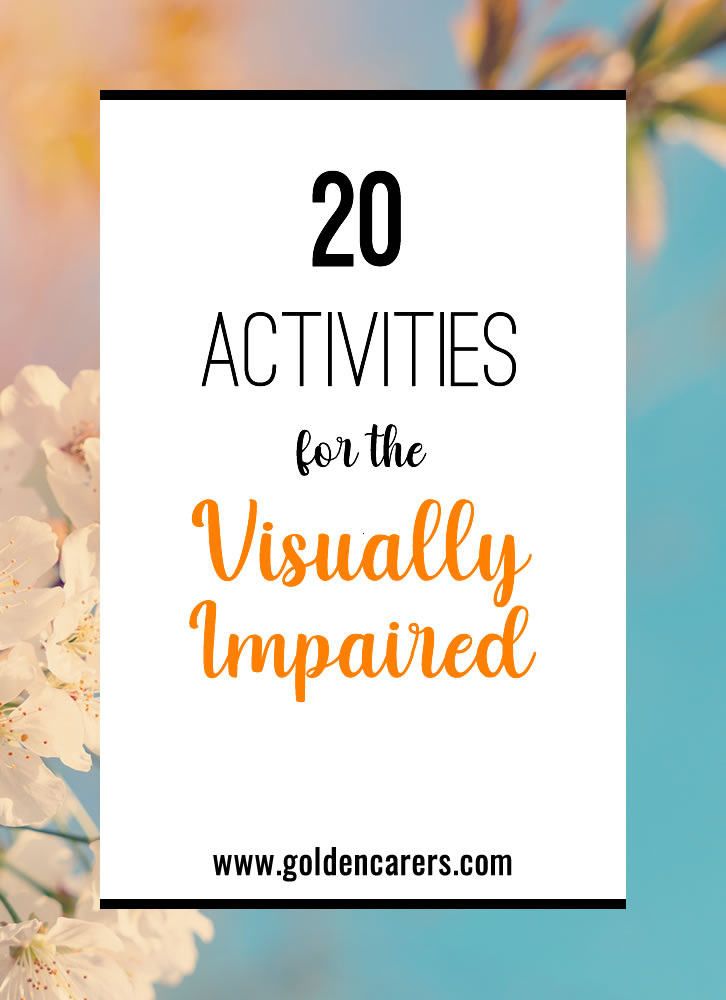
Golden Carers has 1000s of activities and resources for senior care.
Individuals facing vision impairment will often require help with everyday tasks that were once easily managed independently. They may also require support to maintain their connections with the community, friends, and leisure pursuits.
Age-related vision loss is a common experience, and empowering individuals to maintain their independence to the fullest extent possible is crucial.
Challenges faced by individuals with vision impairment:
- Lack of confidence
- Reduced mobility (to prevent falls)
- Heightened loneliness
- Social exclusion (limited accessibility in public places like cinemas, restaurants etc.)
- Feelings of being a 'burden'
- Limited awareness of available support services
- Financial constraints (poverty)
Tips for Communicating with Visually Impaired Individuals
- Speak in a normal tone; avoid speaking too loudly.
- Use everyday language, including words like 'look' and 'see.'
- Provide specific directions instead of vague references.
- Clearly identify yourself upon entering their presence: "Hi Mavis, it's Linda".
- Describe visual details when necessary.
- Avoid patronizing language; don't assume you have to make things 'easy' for them.
- Check if help is required and ask them for instructions on how to help.
- Speak directly to the person, don't channel the conversation through a third person.
- When walking with them describe the terrain; steps, carpet etc.
- Always respect their individuality and independence."
20 Activities for People with Vision Impairment:
- Read Aloud: Discover their literary preferences and read to them.
- Talking Books: Borrow audiobooks from the local library.
- Share Jokes: Engage in light-hearted humor to lift their spirits.
- Tactile Games: Play tactile games like Dominos or Tic-Tac-Toe.
- Coffee Outings: Take them to a coffee shop weekly for exercise and sensory stimulation.
- Air Dry Clay: Encourage them to work with air dry clay for creative expression.
- Social Group: Invite them to join a group of visually impaired peers for support and socialization.
- Volunteer Companionship: Seek volunteers for regular visits and companionship.
- Pet Therapy: Arrange visits from docile pets, according to their preferences.
Related: Pet Therapy in Nursing Homes - Gentle Exercise: Consider activities like yoga or tai chi with clear verbal instructions.
Related: Gentle Chair Exercises - Listen to the Radio: Explore local radio programs, including talk shows, science, book readings, spiritual broadcasts, and music.
Related: Free music playlists for the elderly - Gardening: Buy a couple of pots, potting mixture and some herb seeds; parsley, basil, thyme. Caring for plants is very therapeutic.
Related: How to Start a Garden Club for Seniors - Cooking Together: Collaborate in preparing salads, fruits, or vegetables, allowing for conversations and sensory stimulation.
- Trivia Games: Share quizzes, word games, and riddles for mental stimulation.
Related: Quizzes Galore - Nature Walks: Enjoy walks in the park to experience the sights and sounds of nature.
- Fishing: Find safe locations for outdoor activities like fishing. Outdoor pursuits are good for the mind and body.
- Children's Visits: Organize trips to local nursery schools or invite them to your facility. The presence of children's laughter and voices can brighten spirits.
- Aromatherapy Sessions: Offer workshops where they can explore various scents and essential oils, enhancing relaxation and sensory experiences.
- Listen to Podcasts: Introduce them to podcasts covering a range of topics, enabling them to stay informed and entertained through auditory content.
- Birdwatching: Create a backyard bird habitat with bird feeders and water, allowing them to enjoy the sounds and interactions of local birds.
6 Empowering Reads for the Vision-Impaired
For clients with some remaining vision, provide high-quality magnifying glasses. Alternatively, explore 'Talking Books' or recruit volunteers to read aloud for 30 minutes twice a week.
- "Touching the Rock: An Experience of Blindness" by John M. Hull
This autobiography offers instructive and deeply moving insights into the author's experience of blindness. - "The Island of the Colour Blind" by Oliver Sacks
Delve into the intriguing story of the Pacific atoll of Pingelap, where a genetic anomaly has resulted in most of the inhabitants being color blind. - "Nightwatch" by Errol Broome
Follow the adventures of a young girl, Chippy, as she attends the local school. Her heightened awareness of sound, smell, and space leads to the discovery of foul play. - "The Country of the Blind" by H. G. Wells
Join Nunez, a mountaineer who slips and falls into a secluded valley where all the inhabitants are blind, in this captivating tale. - "If You Could See What I Hear" by Tom Sullivan
Tom Sullivan, blind from birth, shares stories that will leave you laughing out loud, offering a unique perspective on life. - "Stars Come Out Within" by Jean Little
Explore the autobiography of Jean Little, a Canadian children's author who has been blind since birth, as she recounts her life experiences. - "A Dolphin in the Bay" by Diana Noonan
Follow the heartwarming story of a young boy whose relationship with a dolphin helps him conquer his fears and find courage.
What activities have you found to work well for visually impaired individuals?
Related Activities
Comments Post a Comment
I am always surprised that so few people know blind golf exists. Pros and better golfers are the people less likely to believe you if you know about blind golf. It's because they can't imagine how such a difficult sport could be conquered by a blind or visually impaired person.
Well guess what - it can be!!

 7th Sep 2021
Activity Director
7th Sep 2021
Activity Director
Thank you for sharing this information

 2nd Jun 2021
Activity Director
2nd Jun 2021
Activity Director
There are some places you can buy Braille bingo cards such as Amazon or Walmart
There is also a Braille store that you might want to try
http://www.braillebookstore.com/Bingo-Playing-Board.1
And you can write a letter to any of these places they may want to donate some to you especially if there’s more things you want to buy
I do not know where you are from but the commission for the blind in the US does have some good materials for the blind
You may want to check this out

 25th May 2021
Activity Director
25th May 2021
Activity Director
How wonderful of you to be taking care of your grandfather
One thing I’d like to do was to rip paper to make different things
For example we made leis using a plastic needle with yarn and scrunching up the paper as you put the needle in it
We had a long strips of paper about 2 inches wide and as long as can be handled
You can also make craft with tiny pieces of tissue paper that you paste on a shape made out of card stock
Pieces do not have to be that tiny but scrunch them up to them and paste and put them on shape
Also making a collage is a good idea
Here are some other ideas
crafts with step by step instructions on Golden Carers. You could try Scavenger Collage, Abayomi Rag Dolls, Sand Bottles, Egg Carton Spring Flowers, Mixed Media Collage. These are good to keep or to give away as gifts.
You could get some scissors which are not sharp that some children use in school
They cut
but they’re not dangerous
If He insists on using a scissors
Appreciate any ideas, please. Thank you.

 18th May 2021
Activity Director
18th May 2021
Activity Director
You have quite a task
Here are some Play-Doh recipes
https://www.goldencarers.com/play-dough-crafts/4020/
https://www.goldencarers.com/basic-salt-dough/4294/
Here are some examples of music activities
https://www.goldencarers.com/search/?search_tag=Activity&search=Music%20activities
My father is a retired doctor and he’s 66 years of age. He is suffering from cardive dyskinesia and also has lost vision due to diabetes. This has led him to depression and he barely interacts with us even though he wants to.
Is there anyway you help me help him?

 23rd Apr 2021
Activity Director
23rd Apr 2021
Activity Director
The most important thing is to make him feel good about himself
Focus on the positive I’m sure there are still things she can do
This article may help you
https://www.goldencarers.com/how-to-create-a-culture-of-happiness/5055/
This one may be helpful also and other music activities
https://www.goldencarers.com/using-music-with-older-adults-during-covid-19/6313/
https://www.goldencarers.com/short-story-jokes-8/6394/
https://www.goldencarers.com/musical-stories-and-song/7072/
There are many good short stories on the site
For your father for like one of them or make up your own
She was just sitting doing nothing when I came to live with her. I got her knitting using larger needles 8’s and thicker yarn . Presently she has knit 3 blankets for family members who thought she couldn’t do anything . We also cook and go for walks using her walker. She is so much happier .

 23rd Feb 2021
Activity Director
23rd Feb 2021
Activity Director
How inspiring
You are a wonderful person

 28th Jan 2021
Activity Director
28th Jan 2021
Activity Director
This seems like a good idea
In fact you can buy a kit to do this
What size fleece do you use??
We did this in a group setting but it could be for an individual as well as you suggest

 30th Jul 2020
Activity Director
30th Jul 2020
Activity Director
Try some of these suggestions
https://www.goldencarers.com/forum-search/?searchterm=Blind
It is best to adapt and modify some thing she used to like to do
Let us know what ideas you come up with
Thanks

 29th Jun 2020
Activity Director
29th Jun 2020
Activity Director
Have you read all the comments here because there are some really good ideas
Is there some thing your mother-in-law liked to do in the past that could be adapted and modified so she could do it now
For example I had a resident who was blind but still could crochet because she had done it all her life she did it but I feel
Obviously this would not work if she never crocheted but maybe there is something else she could do by feel
Someone had suggested clay that she could mold into anything really
If you could help her do handover hand exercises
Start with easier ones just three or four to begin with
There are some really good ideas from Gwyneth
https://www.goldencarers.com/exercise/
If you need help adapting an activity your mother-in-law liked to do in the past let me know and I will help you with it
Good luck to you and let us know what ideas worked

 2nd Jun 2020
Activity Director
2nd Jun 2020
Activity Director
It sounds like you are doing a great job
Here are some jokes you might want to try
https://www.goldencarers.com/search/#stq=Jokes&stp=1
Here are some spiritual activities you might want to try
https://www.goldencarers.com/search/#stq=Spiritual%20activities&stp=1

 2nd Jun 2020
Activity Director
2nd Jun 2020
Activity Director
I also found this article that might be helpful
https://www.goldencarers.com/12-ways-to-support-visually-impaired-seniors/6211/

 19th May 2020
Activity Director
19th May 2020
Activity Director
Kids are adaptable
I do not know where you are from but in the US there is the commission for the blind that is very helpful but it may take a while for them to get to you
If your grandson likes to read there are books on tape and also there are many programs on the Internet for reading books
In fact there are computers and other devices for the blind that use the Internet
Good luck to you
It sounds like your grandson is a real fighter

 3rd May 2020
Activity Director
3rd May 2020
Activity Director
Make sure you call her every day and remind her to do whatever it is you decide is right for her
You want to know what her past interests were and if you can adapt and modify them to some things she could do
For example you want provide things that are large print such as a large print word search if that something she likes
You could make some for her and mail them to her since you can’t visit any longer
She would appreciate the mail if nothing else
You could also send her large print letters especially ones that are positive to put her in a good frame of mind
You can send her many because I am sure she would like to open them
Send her jokes that you made in large print
Send her short story that you made in large print
Here are some but you may have to retype them so she can see them
https://www.goldencarers.com/search/#stq=funny%20stories&stp=1
Then when you call you can ask her which ones she likes the best and send her more like that
If you tell me what her past interests or perhaps I can help you adapt and modify them

 19th Jan 2020
Activity Director
19th Jan 2020
Activity Director
Is the client in a group setting or are you working with him individually
Has he had an evaluation by an occupational therapist to see what his strengths and weaknesses are and his likes and dislikes
Have you contacted the commission for the blind they have some good tools you can use
Do you have any budget to buy things for him or does everything have to be donated
I would suggest some headphones maybe you can get some donated and have his favorite songs on the headphones
You could try this sensory activity and see if he likes it
https://www.goldencarers.com/treasure-hunt-/3291/
Also think about getting a keyboard or some other type of object where he can press the large buttons
Also maybe some kind of paper folding activity
Also some physical activity is very important
He may be able to run or jump or skip
He could use a large ball
If you need more suggestions let me know
There are smart phones which can be set up at an Apple store, and these have SERI and voice over. As the article said, there are talking books, and of course audio books and other books from Liverbox, a place on the web.
There are chat rooms for the blind such as: "cafe for the blind." You can listen to movies with video description on that site, or you can go to "movies for the blind." or comcast has the box which also has a screen-reader and you can listen or watch Tv by using it.
or if you have a computer, you can download games which have sappy voices. This site has card games, word games, and even psudokoand the site is called "spoonbill games for the blind" and they are for free. Just some ideas.

 3rd Sep 2019
Activity Director
3rd Sep 2019
Activity Director
 10th May 2019
10th May 2019
She has never been a reader, so that's out. Does anyone know of any tactile activities besides clay that she can do while sitting in her chair.
The blind just don't shirvel up an nonexist, they live on like sighted people! There has to be home activities she can do! Help please!!!!
 19th Mar 2018
Diversional Therapist
19th Mar 2018
Diversional Therapist
Braile Rubik
Voice recorder
Talking Dart Board
Voice Watch
Making lavender pillows (for self or gifts)
Unravel wool sweater for someone's else to knit
He is 65 years old. Any suggestions would be great. Thank You
Keren Rice
 7th Aug 2017
Diversional Therapist
7th Aug 2017
Diversional Therapist
 8th Aug 2014
Lifestyle Coordinator
8th Aug 2014
Lifestyle Coordinator
We place the cage by her bedroom window when she's in there and he chirps away. She enjoys listening to him and feeling responsible for him for the day.
 28th May 2014
Activities officer
28th May 2014
Activities officer
Regards Scott
 25th Mar 2014
Recreation Officer
25th Mar 2014
Recreation Officer
 25th Mar 2014
Lifestyle Coordinator
25th Mar 2014
Lifestyle Coordinator
 25th Mar 2014
Activities Assistant Team Leader
25th Mar 2014
Activities Assistant Team Leader

 25th Mar 2014
Lifestyle CoOrdinator
25th Mar 2014
Lifestyle CoOrdinator
 21st Feb 2021
Lifestyle Coordinator
21st Feb 2021
Lifestyle Coordinator
 24th Mar 2014
Diversional therapist
24th Mar 2014
Diversional therapist


 Stick Figure Drawing & Storytelling
Stick Figure Drawing & Storytelling
 The Benefits of Coloring-in for the Elderly
The Benefits of Coloring-in for the Elderly
 25 Comedy, Skits, and other Funny Ideas for Entertaining
25 Comedy, Skits, and other Funny Ideas for Entertaining
 How to write an Activity-Based Care Plan
How to write an Activity-Based Care Plan


also in a lot of pain with her back and shoulders
Mobility is poor and can only go out in a wheelchair but is in to much pain most of the time.
Struggling to help with her pain relief and dinners
Wont have a carer
Any ideas ?
What did your mother like to do before? Is there any way you can adapt these things?
What does her doctor suggest for the pain?
I find that people who are busy doing some thing forget about their pain
Can she ride in a car?
I am sure your community has a senior center with many activities. You can go with her and help her.
I find music to be very good
How is her hearing?
If I can be of some more help, let me know